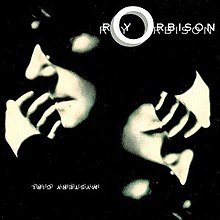
Jeffrey Lynne is an English musician, singer-songwriter and record producer. He is the co-founder and leader of the rock band Electric Light Orchestra (ELO), which was formed in 1970, and as a songwriter has written most of the band's hits, including "Evil Woman", "Livin' Thing", "Telephone Line", "Mr. Blue Sky", "Don't Bring Me Down" and "Hold On Tight".
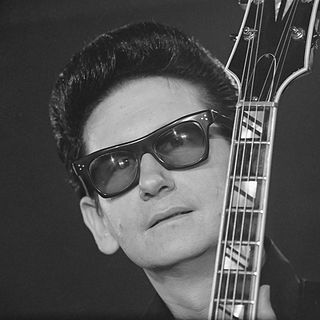
Roy Kelton Orbison was an American singer, songwriter, and musician known for his impassioned singing style, complex song structures, and dark, emotional ballads. His music was described by critics as operatic, earning him the nicknames "The Caruso of Rock" and "The Big O". Many of Orbison's songs conveyed vulnerability at a time when most male rock-and-roll performers chose to project machismo. He performed while standing motionless and wearing black clothes to match his dyed black hair and dark sunglasses.

Traveling Wilburys were a British-American supergroup active from 1988-1991 consisting of Bob Dylan, George Harrison, Jeff Lynne, Roy Orbison and Tom Petty. They were a roots rock band and described as "perhaps the biggest supergroup of all time".
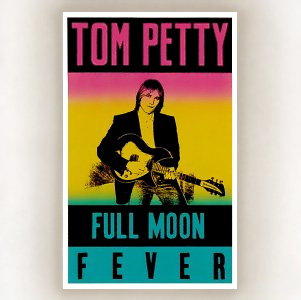
Full Moon Fever is the debut solo studio album by Tom Petty, released on April 24, 1989, by MCA Records. It features contributions from members of his band the Heartbreakers, notably Mike Campbell, as well as Jeff Lynne, Roy Orbison, and George Harrison, Petty's bandmates in the Traveling Wilburys. The record shows Petty exploring his musical roots with nods to his influences. The songwriting is mainly collaborations between Petty and Lynne, who was also a producer on the album. Full Moon Fever became a commercial and critical success, peaking at No. 3 on the U.S. Billboard 200 and being certified 5× platinum in the United States and 6× platinum in Canada.

Greatest Hits is a compilation album by Tom Petty and the Heartbreakers, released in 1993. It is Petty's best-selling album to date and was certified 12× Platinum by the RIAA on April 28, 2015. The single "Mary Jane's Last Dance" became one of Petty's most popular songs, reaching No. 14 on the Billboard Hot 100 and No. 1 on the Billboard Mainstream Rock Tracks chart. The other new song on the album is a cover of the Thunderclap Newman hit "Something in the Air". The album contains no songs from 1987's Let Me Up . However, three songs from Petty's 1989 solo album Full Moon Fever were included.

"Handle with Care" is a song by the British-American supergroup the Traveling Wilburys. It was released in October 1988 as their debut single and as the opening track of their album Traveling Wilburys Vol. 1. The song was the first recording made by the group, although it was originally intended as a bonus track on a European single by George Harrison. When he and Jeff Lynne presented the song to Harrison's record company, the executives insisted it was too good for that purpose, a decision that resulted in the formation of the Wilburys. The song was written primarily by Harrison, although, as with all the tracks on Vol. 1, the writing credit lists all five members of the band: Harrison, Lynne, Bob Dylan, Roy Orbison and Tom Petty.

The Traveling Wilburys Vol. 1 is the debut studio album by the English-American supergroup Traveling Wilburys, comprising George Harrison, Jeff Lynne, Bob Dylan, Roy Orbison and Tom Petty. It was released in October 1988 to commercial success and critical acclaim. Although Harrison had long planned to start such a band, the project came about through happenstance. Harrison was in Los Angeles and in need of a B-side for a single from his album Cloud Nine, which resulted in the participants collaborating informally on the song "Handle with Care" at Dylan's home.

Traveling Wilburys Vol. 3 is the second and final studio album by the Traveling Wilburys, a group consisting of George Harrison, Jeff Lynne, Bob Dylan and Tom Petty. It was released on October 29, 1990, as the follow-up to their 1988 debut, Traveling Wilburys Vol. 1. The band members again adopted pseudonyms for their contributions, using new names from the fictitious Wilbury brothers.
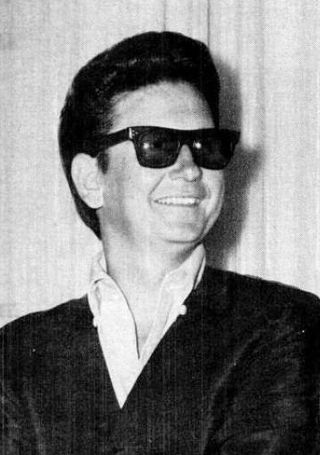
Roy Orbison was an American singer-songwriter who found the most success in the early rock and roll era from 1956 to 1964. He later enjoyed a resurgence in the late 1980s with chart success as a member of the Traveling Wilburys and with his Mystery Girl album, which included the posthumous hit single "You Got It". At the height of his popularity, 22 of Orbison's songs placed on the US Billboard Top 40 chart, and six peaked in the top five, including two number-one hits. In the UK, Orbison scored ten top-10 hits between 1960 and 1966, including three number-one singles.

Into the Great Wide Open is the eighth studio album by American rock band Tom Petty and the Heartbreakers, released in July 1991. The album was the band's last with MCA Records. The album was the second Petty produced with Jeff Lynne after the success of Full Moon Fever.

"End of the Line" is a song by the British-American supergroup the Traveling Wilburys. It was the final track on their debut album Traveling Wilburys Vol. 1, released in October 1988. It was also issued in January 1989 as the band's second single. The recording features all the Wilburys except Bob Dylan as lead singers; George Harrison, Jeff Lynne and Roy Orbison sing the choruses in turn, while Tom Petty sings the verses. The song was mainly written by Harrison and was assigned to his publishing company, Umlaut Corporation. However, all five members of the group received a songwriting credit in keeping with the collaborative concept behind the Wilburys project.

A Black & White Night Live is a Roy Orbison music album made posthumously by Virgin Records from the HBO television special, Roy Orbison and Friends: A Black and White Night, which was filmed in 1987 and broadcast in 1988. According to the authorised Roy Orbison biography, the album was released in October 1989 and included the song "Blue Bayou" which because of time constraints had been deleted from the televised broadcast. However, it did not include the songs "Claudette" and "Blue Angel", which were also cut from the original broadcast for the same reason.

"You Got It" is a song from American singer Roy Orbison's 22nd studio album, Mystery Girl (1989). The song was released posthumously on January 3, 1989, after Orbison's death from a heart attack on December 6, 1988. The song was issued with "The Only One" as the B-side and was later released with "Crying". The single reached number nine on the US Billboard Hot 100 and number one on the Adult Contemporary chart, returning Orbison to the top 10 for the first time in 25 years. "You Got It" also reached number three on the UK Singles Chart and entered the top five in 10 other countries. Although it is an Orbison solo single, Orbison's fellow Traveling Wilburys bandmates, Tom Petty and Jeff Lynne, co-wrote the song and played instruments on the record.

Highway Companion is the third and final solo studio album by American singer-songwriter Tom Petty. It was released on July 25, 2006, and charted at No. 4 on the Billboard 200 album chart. The album was produced by former Traveling Wilburys bandmate Jeff Lynne, who also produced Petty's highly acclaimed first solo album, Full Moon Fever, as well as the Heartbreakers' next album Into the Great Wide Open. Petty released the album through Rick Rubin's American Recordings label and Warner Bros. Records, where Petty has had a record contract since his second solo album, Wildflowers. The tracks "Saving Grace" and "Big Weekend" were released July 4, 2006 on the iTunes Music Store. It ended up being Petty's only album for American Recordings, as that label moved to Columbia Records distribution in 2007; Warner Bros retained the rights to Petty, eventually reassigning him to subsidiary label Reprise Records.

Armchair Theatre is the first solo album by Jeff Lynne, released in 1990.

The Traveling Wilburys Collection is a box set compilation album by the British-American supergroup the Traveling Wilburys. It comprises the two studio albums recorded by the band in 1988 and 1990, with additional bonus tracks, and a DVD containing their music videos and a documentary about the group. The box set was released on 11 June 2007 by Rhino, in association with Wilbury Records.
"Not Alone Any More" is a song by the British–American supergroup the Traveling Wilburys from their 1988 album Traveling Wilburys Vol. 1. It was sung by Roy Orbison and serves as his main contribution to the album. The song was written mainly by Jeff Lynne, although all five members of the Wilburys are credited as songwriters.
"Heading for the Light" is a song by the British–American supergroup the Traveling Wilburys from their 1988 album Traveling Wilburys Vol. 1. It was written primarily by George Harrison but credited to all five members of the band. Harrison sings the song with Jeff Lynne, who also co-produced the track and, with Harrison, formulated the idea for starting the Wilburys. The song was issued as a promotional single in the United States, where it peaked at number 7 on Billboard's Album Rock Tracks chart. The song received a commercial release in Australia in 1989, where it peaked at number 88 on the ARIA singles chart.
"California Blue" is a song written by Roy Orbison, Jeff Lynne, and Tom Petty. According to The Authorized Roy Orbison, Orbison recorded the song in April 1988 at Mike Campbell's garage in Los Angeles. "California Blue" was released as a single from Orbison's 22nd studio album, Mystery Girl, in July 1989, reaching the top 40 in Belgium, Ireland, and West Germany.
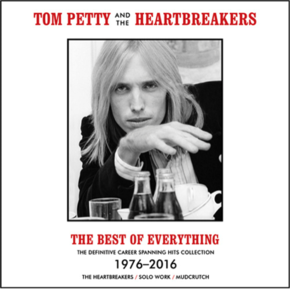
The Best of Everything is a 2019 greatest hits album with recordings made by Tom Petty, with his backing band The Heartbreakers, as a solo artist, and with Mudcrutch. It was released on March 1.
